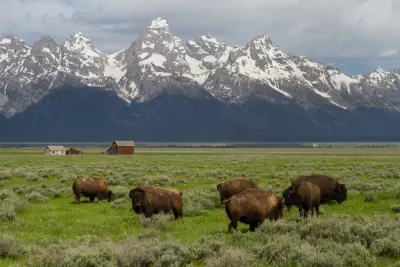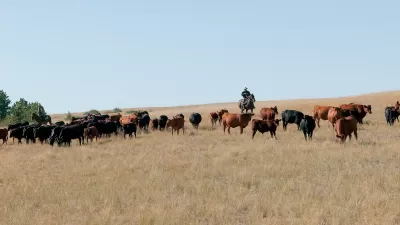After decades of protecting extractive interests, federal law could reverse course and put conservation on par with other uses.

Writing in High Country News, Jonathan Thompson analyzes the potential impact of the Biden administration’s proposed Public Lands Rule, which could “put conservation on a par with other uses of federal lands, such as grazing, oil and gas drilling and mining.” According to Thompson, this could lead to a “seismic shift” for public land management in the United States that would reverse the tendency to privilege development over conservation.
As the rule’s text itself explains, “This proposed rule is designed to ensure … public lands continue to provide minerals, energy, forage, timber, and recreational opportunities, as well as habitat, protected water supplies, and landscapes that resist and recover from drought, wildfire, and other disturbances.”
Thompson briefly describes the history of recent U.S. land management law, starting with the Federal Land Policy and Management Act (FLPMA) of 1976, which “required that public lands be managed for multiple uses and sustained yields rather than to maximize extraction” and prompted the ‘Sagebrush Rebellion’ of the following years and the rollback of conservation measures during the Reagan administration.
“The new rule would codify procedures developed over the last 40 years to provide consistency. But it would also beef up the protective strength of the provision by requiring ‘consideration of ecosystem resilience, landscape-level needs, and rapidly changing landscape conditions’ when designating and managing ACECs,” or Areas of Critical Environmental Concern.
But the rule is far from finalized or approved, and Thompson warns that “If Interior does not move quickly and a less conservation-friendly administration takes control of the White House in 2024, then the new rule could be tossed out relatively easily.”
FULL STORY: A ‘seismic shift’ for public lands?

Planetizen Federal Action Tracker
A weekly monitor of how Trump’s orders and actions are impacting planners and planning in America.

Map: Where Senate Republicans Want to Sell Your Public Lands
For public land advocates, the Senate Republicans’ proposal to sell millions of acres of public land in the West is “the biggest fight of their careers.”

Restaurant Patios Were a Pandemic Win — Why Were They so Hard to Keep?
Social distancing requirements and changes in travel patterns prompted cities to pilot new uses for street and sidewalk space. Then it got complicated.

Albuquerque Route 66 Motels Become Affordable Housing
A $4 million city fund is incentivizing developers to breathe new life into derelict midcentury motels.

DC Area County Eliminates Bus Fares
Montgomery County joins a growing trend of making transit free.

Platform Pilsner: Vancouver Transit Agency Releases... a Beer?
TransLink will receive a portion of every sale of the four-pack.
Urban Design for Planners 1: Software Tools
This six-course series explores essential urban design concepts using open source software and equips planners with the tools they need to participate fully in the urban design process.
Planning for Universal Design
Learn the tools for implementing Universal Design in planning regulations.
Heyer Gruel & Associates PA
JM Goldson LLC
Custer County Colorado
City of Camden Redevelopment Agency
City of Astoria
Transportation Research & Education Center (TREC) at Portland State University
Camden Redevelopment Agency
City of Claremont
Municipality of Princeton (NJ)





























